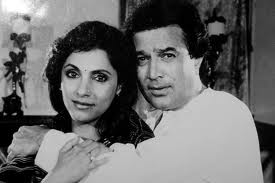
New Delhi: If there was one person continuously guarding Rajesh Khanna's health during his last days, it was Dimple Kapadia. Though Dimple didn’t prefer to come into the limelight much, she remained the force behind Kaka.
Raj Kapoor discovered Dimple Kapadia at the age of 13 and signed her for ‘Bobby’. The film later went on to become a hit but Dimple (16) took a strange decision of marrying the then superstar Rajesh Khanna (31) before the release of ‘Bobby’. However, the stranger things were yet to come. Dimple left the film world to raise her children.
But as they say, the glamour world is the other name of ecstasy, the poster perfect family life of Rajesh Khanna and Dimple Kapadia started to disintegrate towards the later years of 1970s. Many think that Kaka’s inability to handle the superstar status was the prime reason behind the marital woes.
Rajesh Khanna had become one star who wasn’t ready to compromise on anything lesser than a superhit while the Hindi film industry had started to shift its focus towards the new supernova of Bollywood in the form of Amitabh Bachchan.
Rajesh Khanna hadn’t stopped giving hits but the angry young man was moving fast towards the superstar tag. Someone had to bear for the fierce competition between two towering stars, so Rajesh Khanna’s family life began to suffer.
On the other hand, Dimple had given birth to two daughters till then; Twinkle breathed her first in 1973 while Rinke was born in 1977.
At one point of time, Dimple decided to return to films. Khanna’s hectic schedule kept him away for most of the time and ultimately the couple found it apt to separate in 1982. Dimple said in an interview given to India Today in 1985, “The life and happiness in our house came to an end the day I and Rajesh got married.”
Rajesh Khanna and Dimple continued to live separately but they didn’t bother to complete the divorce proceedings. Dimple returned to films and Rajesh Khanna’s acting career came to a halt, before he was fetched into politics.
Time washed away the bitterness between the couple and the two started to appear together in parties in the beginning of 1990s. Dimple also campaigned for Khanna during the elections in 1992.
Though the stardom was gone but Rajesh Khanna was itching for a comeback. He decided to produce ‘Jai Shiv Shankar’ (1992) with him and Dimple in the lead, unfortunately the film didn’t work.
But the lost love had returned to Rajesh Khanna’s life. Dimple remained Khanna’s closest ally till his last days.





Comments
Add new comment